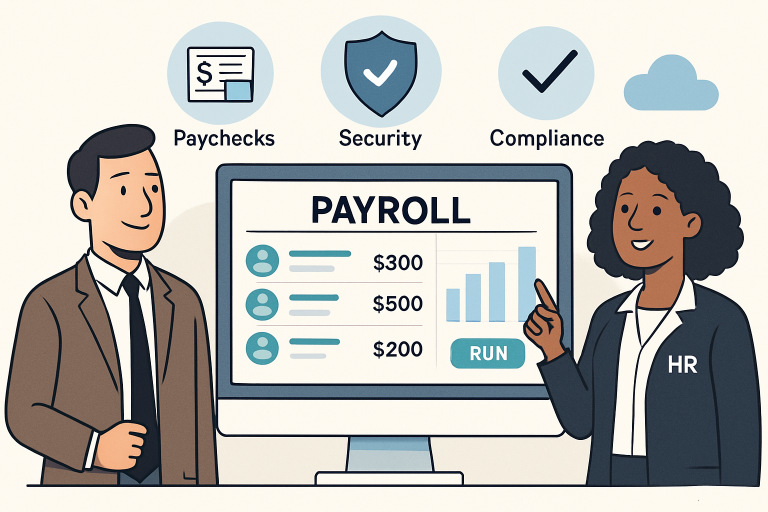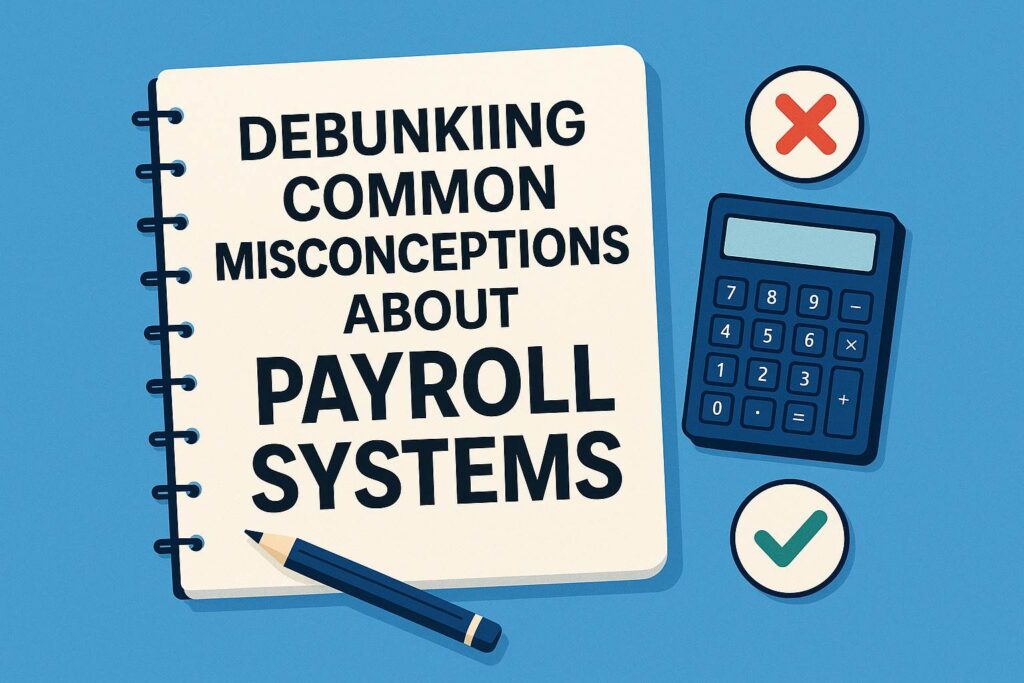Introduction
Payroll is at the core of any business’s operations, yet numerous myths shape how companies approach this vital function. Errors and misunderstandings around payroll can introduce costly inefficiencies and compliance risks, making it critical for leaders to separate fact from fiction. To help business owners and HR professionals navigate payroll confidently, this article tackles the most prevalent payroll myths, aligning with expert guidance such as ADP® myths and misperceptions and other reputable resources. With the field rapidly evolving and regulations changing regularly, it’s more important than ever for businesses to base payroll decisions on accurate, up-to-date information rather than outdated assumptions or secondhand advice. Mastering payroll management—informed by data, technology, and compliance best practices—ultimately protects both your workforce and your business’s bottom line.
Key Takeaways
- Payroll is multifaceted, encompassing far more than just cutting paychecks, from tax requirements to benefits and labor law adherence.
- Outsourcing payroll is a strategic choice for businesses of any size, not just large organizations.
- Modern payroll software delivers improved accuracy, efficiency, and compliance through automation.
- Staying compliant with payroll regulations is a recurring task, necessitating ongoing attention.
Understanding the Complexity of Payroll
Contrary to popular belief, payroll is not simply about calculating wages and issuing paychecks. Today’s payroll involves several intricate steps and strict adherence to federal, state, and sometimes even local laws. Essential elements of payroll management include withholding and remitting payroll taxes, calculating benefits and voluntary deductions, keeping up with wage and hour laws such as the Fair Labor Standards Act (FLSA), and ensuring timely and accurate payments. Errors in any of these areas can expose a business to audits, fines, and reputational damage. Regular reviews, training, and integrating compliance expertise are key to managing payroll complexities.
The Benefits of Outsourcing Payroll
Many smaller organizations dismiss outsourcing payroll as a luxury reserved for large corporations. In reality, payroll outsourcing provides value to businesses of all sizes. When payroll is managed by third-party experts, companies often benefit from substantial time savings, reduced administrative burden, lower risk of compliance errors, and the latest technology—all at a predictable cost. Outsourcing also offers peace of mind; professionals constantly monitor regulation changes and handle the heavy lifting so HR and finance teams can focus on supporting the organization’s strategic goals rather than routine administrative tasks.
Advantages of Payroll Software

Some business owners worry that implementing payroll software will be expensive, require lots of training, or be too complicated for smaller teams. However, recent advancements in payroll technology have transformed these solutions into affordable, intuitive, and scalable options for almost any organization. Cloud-based payroll platforms offer automated tax calculations, up-to-date compliance alerts, streamlined onboarding, and user-friendly dashboards. Automation minimizes human error and reduces manual work, while robust support and regular updates ensure the system adapts as business needs evolve. This makes payroll software a wise investment, regardless of company size.
The Importance of Ongoing Compliance
One of the most dangerous payroll misconceptions is assuming that compliance is a one-and-done box to check. Tax codes, minimum wage laws, paid leave rules, and benefits regulations change frequently and can vary by location. Regular audits, ongoing staff education, and careful monitoring of legislation are necessary to stay compliant. Failing to adjust payroll processes in response to new regulations can trigger hefty penalties and even legal action. Consistently updating payroll policies and systems is essential for reducing regulatory risk and building trust with employees.
Proper Employee Classification
Misclassifying employees as independent contractors is a well-known payroll pitfall. Although classifying a worker as a contractor might appear to reduce costs, the legal and financial risks often outweigh any short-term savings. The IRS, Department of Labor, and state agencies routinely audit businesses to ensure workers are classified appropriately. Each category comes with unique tax obligations, benefits eligibility, and protections under labor laws. Business leaders must educate themselves on the criteria distinguishing employees from contractors—including factors such as degree of control, type of work, and the permanence of the relationship—to avoid costly missteps.
Payroll Solutions for Small Businesses
It’s a common myth that formal payroll systems are only necessary for mid-size or large businesses. In reality, manual payroll management—even for a handful of employees—can quickly become time-consuming and prone to errors. Missed tax deadlines or wage calculations can lead to fines, unhappy employees, and reputational harm. Investing in a reliable payroll solution or choosing to outsource enables small business owners to operate efficiently, meet their legal responsibilities, and focus on growth rather than paperwork. Scalable payroll services are now available to suit businesses of nearly every size.
Ensuring Data Security in Payroll
Data security remains a concern for organizations considering a move to outsourced payroll or cloud-based payroll platforms. Trusted payroll providers employ advanced data protection strategies such as encryption, multi-factor authentication, and frequent system audits to safeguard personal and financial information. Businesses should vet providers by reviewing their data security certifications and privacy policies to ensure employee data is always handled with the highest levels of confidentiality and compliance. Strong security not only protects company and employee data but also builds trust with your workforce and stakeholders.
Conclusion
Effective payroll management means staying vigilant against misconceptions that can negatively impact a business’s finances and workforce morale. Embracing best practices—backed by accurate information, modern software, professional expertise, and continuous compliance—leads to smoother payroll operations, decreased risk, and better outcomes for both employers and employees. As laws, technology, and business needs continue to evolve, regularly reviewing your payroll approach is not just prudent but essential for sustainable growth and operational excellence.

